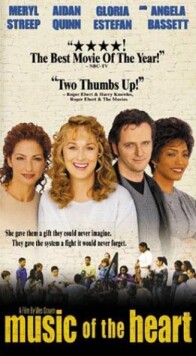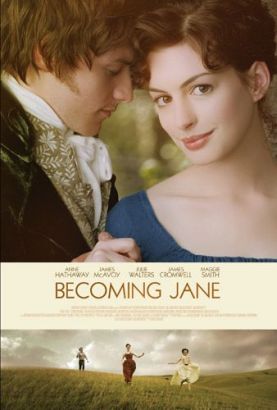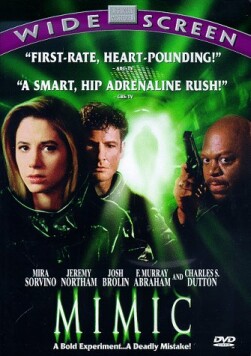Curious Case of Benjamin Button, The
Never, quite possibly, in the history of the American cinema has a bigger, baggier monster been brought to birth and flourishing — thirteen Academy Award nominations! — from a more nugatory source than The Curious Case of Benjamin Button. Scott Fitzgerald’s short story of 1920 is the slightest of jeux d’esprit, an avowed “experiment” based on Mark Twain’s observation that it is a pity that the best part of life comes first and the worst last. To Fitzgerald, this proved the excuse for a joke, and a very slight one. In my edition of his short stories, the editor, Matthew Bruccoli, apologizes for that slightness by writing that, as he and (presumably) Fitzgerald see it, “the challenge of fantasy is to make impossible events convincing.” Not any more it isn’t! It’s simply to revel in the fantasy and convincing be damned — which I, for one, don’t call much of a challenge.
It should not be surprising, then, that one of the messages of this message-laden film — they had to put something in it to make up for Fitzgerald’s lack of substance — is precisely that fantasy is as good as reality. Or, to put it as the not-aging-but-youthening hero, the eponymous Mr Button (Brad Pitt), does in one of his frequent, heart-tugging voiceovers, “Anything is possible.” Americans, or at least American movie-audiences, love to be told things like this, even though they are patently untrue. Lots of things may be possible but there are also a very great many which are not — one of which is the birth of a child who is an old man and ages backwards. That’s just not how nature works. Everybody knows this. Hollywood amuses itself by pretending that what everybody knows isn’t true. The mystery is why it should amuse anyone else.
Apparently it does. At this writing, the movie has made over $100 million to go with the Oscar nominations, and yet I can see nothing in it of any interest at all. Instead, it is simply the piling up of one absurdity on top of another and not even for the purpose of raising a laugh. But then you’d have to have been pretty inattentive to our cultural milieu these last 30 years or so not to have realized that absurdity has stopped being funny and started being the stuff of and inspirational story-telling and homely moralism, often repeated. For instance: “You can be mad as a mad dog at the way things went; you can swear and curse the fates, but when it comes to the end, you have to let go.” Do you, indeed? You can just about live with this combination, perhaps, if the absurdity has at least a hint of irony about it, but there is nothing like that in Benjamin Button. On the contrary, the seriousness with which it takes its own absurdities would make it quite insufferable even if it weren’t nearly three hours long.
Benjamin Button
, both movie and character, has the same sort of punkin-headed faux innocence as Forrest Gump (1994), and the film makes a similarly patronizing use of its Southern setting — in New Orleans, mainly, but also, most oddly and implausibly, in Murmansk. Fitzgerald’s story is set in Baltimore. Like Gump, too, it takes a simple-minded person and freak of nature and makes of him a sage and a shaman who is meant to teach us how to live our lives. It even has its own brainless banality as a catch-phrase, to match “life is like a box of chocolates” — namely, “You never know what’s coming for you.” There is also a Gump-like attempt, though less systematic, to match its idiot-savant hero to events of national or world importance, including Hurricane Katrina which provides the framework for the story’s telling in flashback, the movie likes its hero progressing crabwise. Benjamin in his earlyish old age also goes to Murmansk as crewman on a tugboat — why a New Orleans tugboat should be in Murmansk is never explained — at the time of the Second World War, except that the war is depicted as beginning, in typically provincial American fashion, with the Japanese attack on Pearl Harbor on December 7th, 1941.
In fact, the Soviet Union was already six months into the German invasion of its western territory at that point and was fighting for its life. Arctic convoys of supplies from Britain (though as yet only to Archangel) had begun and been running for three months. Before that, the Soviets had been on the German side in the war and engaged in a war of their own with Finland. None of this elementary history makes it into the movie. “If there was a war, we didn’t see it,” as yet another syrupy voiceover tells us. Accordingly, Murmansk is a peaceful, even sleepy town where a still elderly (i.e. not yet young) Benjamin has a pleasant and leisurely dalliance with Elizabeth (Tilda Swinton), a sometime channel swimmer and wife of the British “trade representative.” He is said to be really a spy, though we are not told for whom. He must not be a very good one if he can’t figure out what his own wife is up to.
This idyll only ends with the Japanese attack on America, six thousand-odd miles away. At that point, the New Orleans tugboat that happens, inexplicably, to be in Murmansk, five thousand-odd miles away in the other direction from where it could reasonably be expected to have any tugging to do, joins the U.S. Navy, already on the spot more or less, and single-handedly takes on and sinks a German U-boat. Hurray for the U.S. of by God A! What any of this nonsense has to do with Benjamin’s equally nonsensical reverse-life is anybody’s guess, though there is a half-hearted attempt or two to make it the occasion for various voiceover meditations on fate. “Sometimes we’re on a collision course, and we just don’t know it. Whether it’s by accident or by design, there’s not a thing we can do about it.”
Sure enough, but you don’t have to live your life backwards to figure that out. In fact, what the central conceit, the “high concept” of Benjamin’s backwards life has to do with anything else in this immensely long and unfunny shaggy-dog story, apart from providing the hero with his stock of gnomic wisdom and an excuse for leaving his marriage to his old-age sweetheart, Daisy (Cate Blanchett), and child during a young-life crisis, remains a mystery. As with Christopher Nolan’s Memento (2000) — which, you will remember, told the story backwards — we have to ask if the gimmick that occupies so much of our attention is anything more than a gimmick. And in this case the answer is no.
Discover more from James Bowman
Subscribe to get the latest posts to your email.





